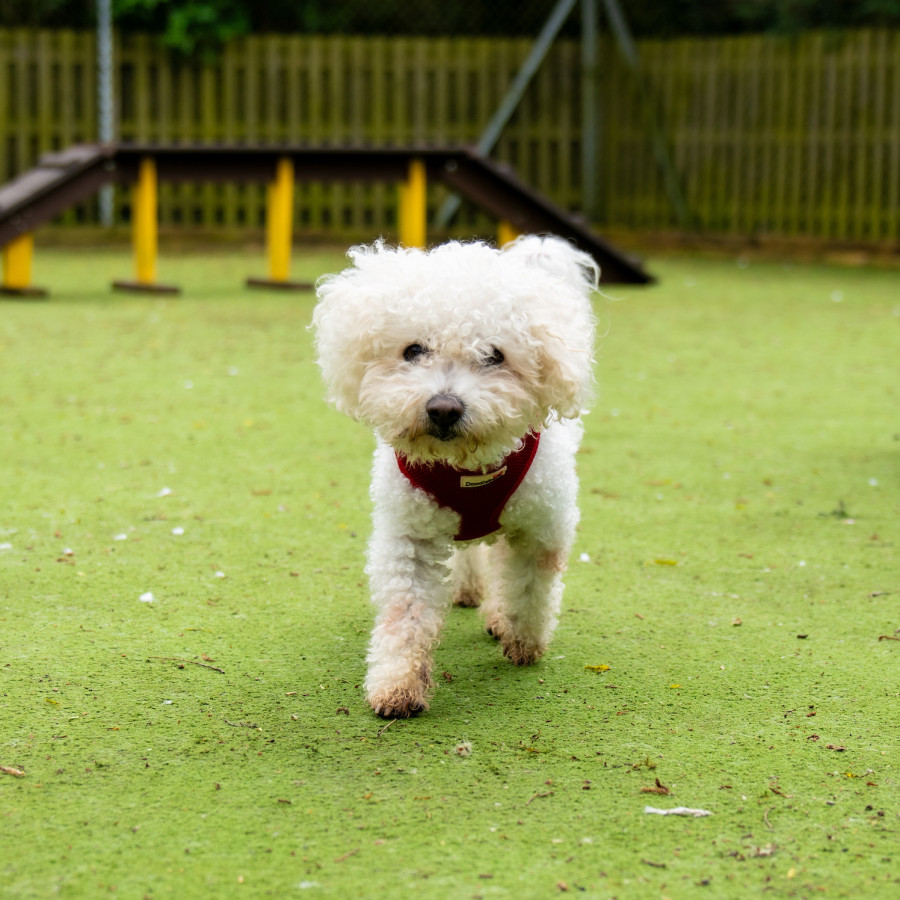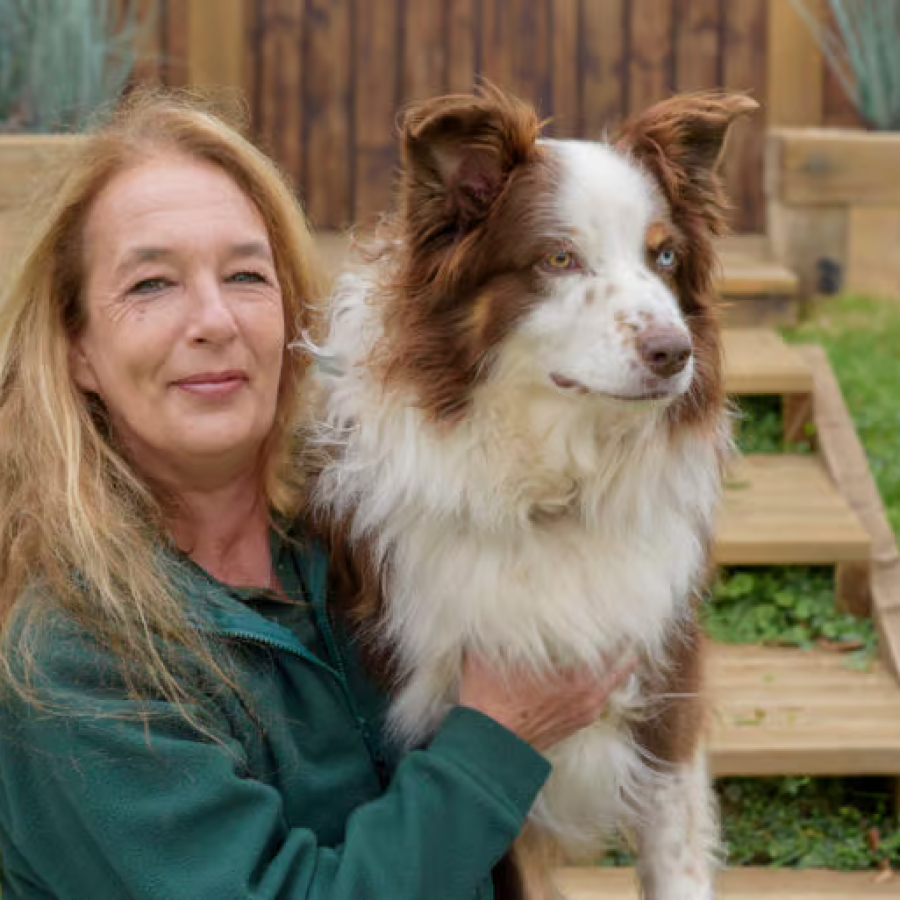
Bichon Frise Dog Breed
Bichons are friendly little dogs that love to play and keep you company.

Bichons are friendly little dogs that love to play and keep you company.
Bichon Frises are happy little fluffy clouds, bred to keep people company. As well as being highly intelligent, they love getting involved in everything you do. Although their grooming needs are high, they won’t shed as much and don’t require a lot of exercise. They’re the ideal for anyone looking for a friendly, playful dog.
These lovely little dogs are happy, playful, and love being with people. They’re generally quite social with children, strangers, and other animals when introduced positively and gently. They were bred to be companions and lapdogs to the European aristocracy, but they’re also great fun! Bichons are super smart and pick up new skills and tricks incredibly quickly, which is great for anyone looking to have fun with their dog and learn new things.
Bichon Frises crave attention and can become anxious if left alone for too long, leading to unwanted behaviours like barking or chewing. They’re known as a “hypoallergenic” breed because they don’t shed very much, but they need to be brushed a few times a week and clipped to keep their coat healthy and tangle-free. Bichons love to be the centre of your world, charming you with their quirky antics or curled up on your lap.
Disclaimer
While these breed traits give a general idea of what to expect from a specific type of dog, it's important to remember that every dog is unique. Just like people, each dog comes with their own distinct personality, quirks, and characteristics!

Absolutely! Bichon Frises are very affectionate dogs. They’ve been bred to be companions and lapdogs since the 13th-century for European nobles. Whilst they might not be the royal dog of choice anymore, they thrive on plenty of time, attention, and snuggles with their favourite people.
Bichons are known for their cheerful nature and adore being fussed. This breed can become very attached to their family members and enjoy being close to them, making them excellent lap dogs. With this affection comes the struggles of being alone. Even if they can’t be in the same room as you, it can make them very upset. With patience and reward-based training, they will learn it’s not scary to be home alone and they may be able to cope better.
Without proper training, socialisation, exercise, and mental stimulation, all dogs can develop behavioural issues.
They’re a social breed, so they don’t like being alone. This can lead to excessive barking, toileting accidents in the home, or your furniture being destroyed when they’re left alone.
Some Bichons are sensitive about their personal space, especially when they meet people they don’t know. They may growl or bite when a stranger says hello to them, or if they feel they’ve been groomed for too long or too roughly.
Bichons can be a little mischievous if they’re not having fun or using their mind to keep them busy. So, if they don’t get what they want, they’ll use their intelligence to work out clever ways to get just that, whether it’s attention, extra snacks, or a comfy resting spot. They can also be difficult to motivate in training, so patience and consistency are key.
All puppies need to learn how to be around people, pets, and other dogs, calmly and politely (known as socialisation). They also need help to feel calm, comfortable, and confident in everyday situations like travelling, the sound of traffic, and being in busy places (known as habituation). This is essential to prevent tricky behavioural problems in the future, and you'll be off to a great start with your ongoing training.
Bichon Frises are pretty easy to train because they’re eager to please their favourite human. However, it can be tricky to keep them motivated, so they need something nice as a treat to keep them going. Patience and consistency are key, and they respond best to rewards like food, toys and praise.
All dogs, including Bichons, should learn basic behaviours, as well as how to interact with other dogs, animals, and people. If not, they can become anxious or develop a rude streak.
Common behavioural issues to watch out for with this breed include separation anxiety, barking, house-training difficulties, destructive chewing and handling/grooming difficulties.
Bichon Frises are prone to certain health conditions including:
Allergies: Skin allergies are common and can cause itching and discomfort.
Patellar Luxation: A condition where the kneecap dislocates, causing pain and lameness.
Cushing's Disease: a hormonal disorder caused by excessive cortisol, leading to increased thirst, frequent urination, and a pot-bellied appearance.
Dental Problems: Their small mouths can lead to overcrowded teeth and dental disease.
Diabetes: Bichons are more likely to develop diabetes than other dogs, which is when the body can’t regulate blood sugar levels properly.
With good care, regular vet visits, and a healthy lifestyle, many of these risks can be minimised, ensuring your Bichon Frise lives a long and happy life.
My favourite thing to do is snuggle up on your lap, but I also enjoy a couple of walks. It helps me get sleepy for later while I’m on the sofa with you!
My distant relatives were entertainers in circuses, and I love learning new tricks! Keep me busy with puzzle toys because otherwise, I might get into mischief.
I’m easygoing when it comes to training, but it needs to be exciting for me to stay motivated. As long as you teach me basic manners and fun tricks, we’ll get along great!
A Bichon Frise costs around £500 to £1,500 depending on the breeder and pedigree. Don’t forget all the dog essentials like food, bed, food bowls, lead and collar. There are also costs like vet bills, grooming, training, pet insurance and more to consider.
Take our quiz to discover which breed is right for you
Take our quizPlease call our pet support line on 0300 303 9333 (7 days a week – 8.30am - 4pm)